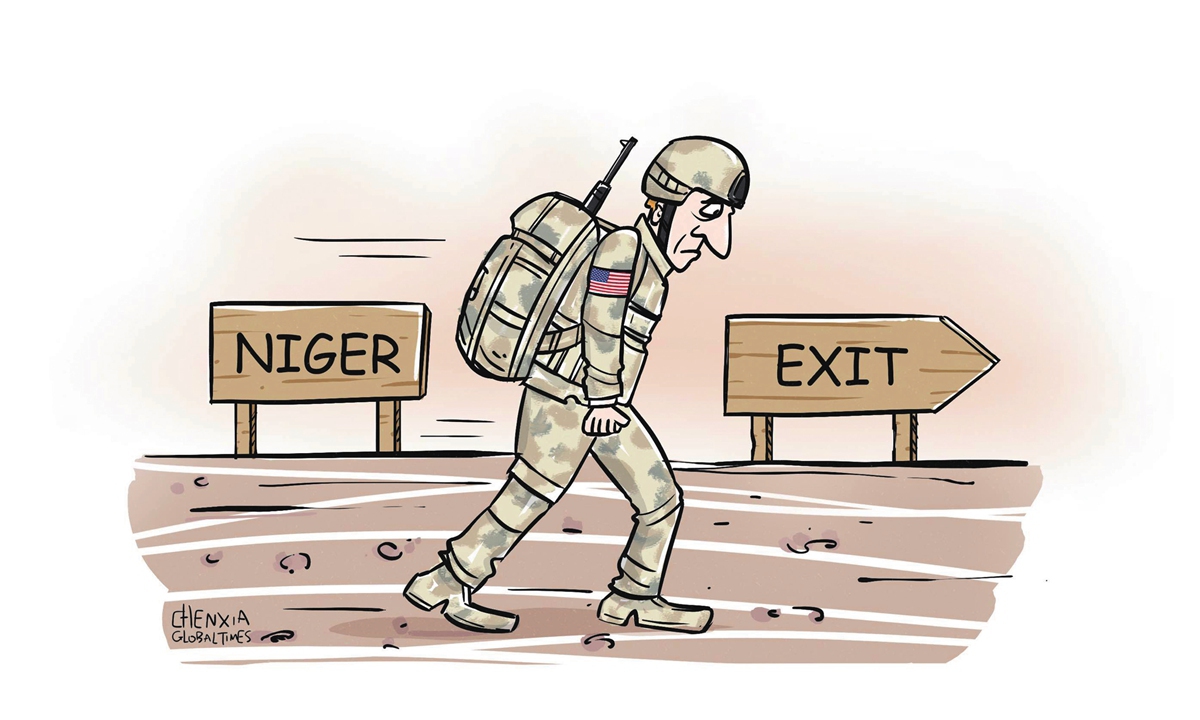
Illustration: Chen Xia/GT
According to Niger's officials on Monday, the US military has completed its withdrawal from air base 201 stationed in the West African country, more than one month ahead of the September 15 deadline the government of Niger has given the US. In March, Niger's authorities declared the US military presence "illegal," while criticizing Washington's efforts to undermine Niger's right to self-determination.
The new government of Niger, which came to power after the military coup in 2023, took a firm stance against the Western military presence and intervention in the country, demanding the withdrawal of US and French troops. Under pressure from the authorities, the French military completely withdrew from the African country by the end of 2023.
Experts told the Global Times that the early withdrawal of US troops from Niger is actually motivated by Washington's own security concerns. Due to local sentiment, the safety of US troops cannot be guaranteed. Therefore, from the point of view of the US military, since it has to withdraw from the country, it might as well do so sooner rather than later to avoid possible unfavorable scenarios.
Judging from many dimensions, the decision of the US troops is actually a reluctant step. As Washington pays more attention to the Asia-Pacific region to counter China, it has had to focus its limited strategic resources more on the Asia-Pacific and gradually reduce its military presence in other regions, including the Middle East and Africa. Also, although Niger has been an important base for Washington's counterterrorism efforts in the Sahel, the long-term US military presence and counterterrorism operations in Niger have become increasingly costly and ineffective in recent years.
For Niger, the complete withdrawal of the US troops means that the African country is continuing on the path of getting rid of Western military intervention. It is also a move toward complete independence from Western countries.
Niger's demand for the withdrawal of Western troops demonstrates a strong will to preserve sovereignty and independent decision-making. Since the end of Western colonial rule in the mid-20th century, post-independence African countries like Niger have gradually developed a strong anti-colonial sentiment. This sentiment is skeptical of external interference, especially when it is seen as perpetuating the unequal relations of the colonial period.
Apart from Niger, in recent years the authorities in many African countries, from Mali to Burkina Faso to Chad, have continued to show Western troops the door. For many countries on the continent, this is a clear demonstration of sovereignty and a strong desire to manage their political and security affairs independently, without Western interference.
The withdrawal of Western troops from Niger could inspire more African countries to take similar measures to reduce their dependence on foreign military forces and strengthen their autonomous defense capabilities. This upsurge in the quest for independence and autonomy against Western colonial influence will further promote the continent's right to self-determination and collective self-confidence in the international arena.
As US troops are kicked out of regional countries like Niger, we should keep in mind that this doesn't mean that the US military is leaving Africa. Driven by its own interests, the US may extend its long arm to other African countries in the future, and even back to Niger if necessary. It may reevaluate its strategy if terrorist activities in the Sahel intensify or if the influence of other great powers in Africa increases. In addition, the country may be motivated by its economic interests to reassert its influence in Africa.
Amid the adjustment of its military layout on the continent, what is clear is the US' hegemonic way of dealing with regional countries, as well as its pursuit of political influence and its military expansion, are not welcomed by the people of the African region. It is obvious that the US won't change its course of hegemony and expansionism in Africa.
Africa does not want to become a chessboard for Washington's hegemony, especially given the US' record of fomenting and promoting proxy wars around the world.
All US actions are bound to arouse a high degree of vigilance on the part of African countries and strong opposition from the people of the continent.




